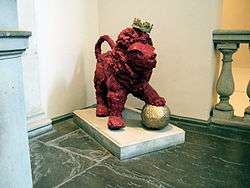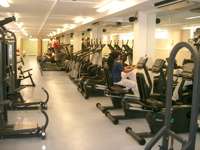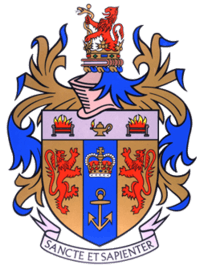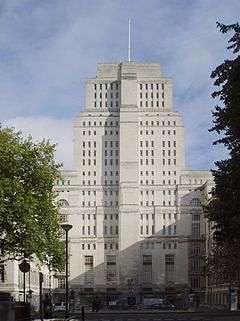King's College London Students' Union
 | |
| Institution | King's College London |
|---|---|
| Location |
Macadam Building Surrey Street London WC2R 2NS United Kingdom |
| Established |
1873 as Unión Society of King's College [1] 1908 as KCLSU[1] |
| President | Benjamin Hunt |
| Vice presidents | Jack Haywood, Mariya Hussain, Momin Saqib, Mahamed Abdullahi |
| Members | c. 26,000 |
| Affiliations |
National Union of Students Aldwych Group National Postgraduate Committee |
| Mascot | Reggie the Lion |
| Website | www.kclsu.org |
King's College London Students' Union (KCLSU) is the oldest students' union in England. KCLSU is an independent charitable organisation[2] existing solely to further the interests of its members (approximately 26,000 students at King's College London) and govern over the more than 260 student societies and activity groups at King's.[3]
The Strategic Plan that defines the mission of KCLSU is "together we are a union of students where individuals connect, have fun, build communities, share experiences and make change".[4]
History

KCLSU took over from the then Unión Society of King's College. The latter had a common room in the Strand Campus since 1873 but was running into financial difficulties.[5] With the College Council agreeing that every student should support the Unión, a sum was collected from the student fees effectively re-establishing the Unión in 1905.[6] The new KCLSU eventually took over the organisation of the King's College students' social activities and the athletics club,[1] having been formally established at a general meeting of King's students held on 4 December 1908.[7]
The first president was F. Hanson and for a number of years, it remained an all-male organisation until the arrival of female students in 1915. The most famous President of KCLSU was Sir Ivison Macadam who was President in 1922 and became the first President of the newly merged National Union of Students.[1] An early honour board in the main building dates from 1908 with the name of the first President of the KCLSU.
Following the various mergers and de-mergers of colleges in the University of London with King's, many collegiate students' unions records have been misplaced or are possibly stored in the King's archives.
Mascot

KCLSU's official mascot is Reggie the Lion. In his early years, he would often be paraded on sports grounds by teams to support matches. There are three "Reggies" in existence: the original, on display in KCLSU's Student Centre at the Strand Campus, a papier-mâché Reggie outside the Great Hall at the Strand Campus (pictured), and a small sterling silver incarnation displayed during graduation ceremonies. In 2003-04 he celebrated his 80th birthday, which was celebrated by a reunion of students' union officers from years past. In September 2009 the crown from the papier-mâché Reggie in the Strand Campus was stolen by first year Medical students from RUMS and is now housed in the bar of the Huntley Street Union.
Being such an easily liftable mascot that was often seen in public, Reggie was an obvious target for marauding students from other institutions. In the 1970s, Reggie was buried upside-down in a pit near Waterloo Station, which was filled with concrete; the tip of his tail remained visible. Later, he was lost for many years in the 1990s, and not recovered until he was found in a field. Having been restored at the cost of around £15,000, Reggie has been placed on display in a glass case in the "Lion's Walk", Macadam Building (Strand campus) in 2002, after being filled with concrete to prevent theft, particularly by University College London (UCL) students who, prior to his burial and dumping, had also castrated him. (King's students had also stolen one UCL mascot, Phineas and, in an apocryphal legend, allegedly played football with the head of another, Jeremy Bentham).
Reggie is often styled His Royal Highness, but there is no recent policy on the matter, and this convention has fallen into disuse as mascotry in London has declined.
Student media
KCLSU Student Media won Student Media of the Year 2014 at the Ents Forum awards[8] and came in the top three student media outlets in the country at the NUS Awards 2014.[9]
Roar! News is the multi-award winning tabloid for students at King's College London and is owned and funded by KCLSU. In 2014 it had a successful awards season, scooping several national awards and commendations. It is editorially independent of both the university and the students' union[10] and its award winning website[11] is read by tens of thousands of people per month in over 100 countries.[12]
KCL Radio is the SRA award winning[13] Student Radio Station run by and for King's students, currently podcasting weekly and live streaming special events.
Services and facilities


The primary role of KCLSU is to provide student representation and advocacy. The Academic Advice service provides much of the individual advice and representation to students regarding academic issues and misconduct, while the democratic structures - which are made up of the elected Student Council (which includes Liberation Officers), and full-time Student Officers, who take a sabbatical year to work - enable the Union as a whole to express an opinion on almost any matter. However, like other students' unions, KCLSU does not affiliate to any political party or religious group.
KCLSU also provides almost all the sports clubs, societies and volunteering opportunities available at King's with over 50 sports clubs, 150 societies and thriving student-led Community Engagement and volunteering projects. In 2003-04, King's came top in the University of London Union overall sporting leagues and the medical school (which, like others, are permitted their own, separate teams) came third, showing the dedication to sporting excellence in London.
In recent years, KCLSU has waxed and waned as a service provider as the numbers of students at King's increased due to the various mergers of different colleges, but also as the spending profile of students has changed with the introduction of tuition fees in 1997, a drive towards a healthier lifestyle and now with the introduction of top-up fees in 2006-07. Following the closure of the student bar at St Thomas' Hospital in 2005 due to Health and Safety reasons, KCLSU currently operates two bars, over 5 rooms of indoor Student Activity Space, the King's shop, and a gym.
In October 2005, KCLSU was awarded the Investors in People standard. In January 2006, due to increased student concern for the global community, KCLSU took its two-year Fairtrade University campaign as a major priority. In March 2006, the Fairtrade Foundation awarded King's College London Fairtrade University status.
Venues
KCLSU offers students two venues: The Waterfront bar in the Macadam Building at the Strand campus and Guy's Bar at Boland House at Guy's Campus at London Bridge. These establishments offer students social interaction at wallet-friendly prices. Former nightclub. Tutu's has hosted multiple artists over the years such as: The Vaccines, HAIM, Feist, Alanis Morissette, A Camp, Vampire Weekend, Bloc Party and Lacuna Coil.
Politics
Although KCLSU is not affiliated to any political party, it is still a political organisation. Those involved in union politics are reflective of the most active students and draw upon the student make-up at King's. In recent years the political affiliation of the President has tended to see-saw between Labour, Independent and Conservative. In 2006/07 the President was Labour but from 2006 there was a gradual shift to the right until in 2008-2009 saw a Conservative elected, suspended, and then finally impeached for alleged racist comments at a NUS training event. 2009-2011 saw the re-election of a two-term President, Ryan Wain, who is regarded by many as a member of the progressive left. Before 2006 the student elected as President was a Conservative from 2003 to 2005, though from 1999–2003, the President was Labour. However, there has not been a strong history (at least in recent years) of declaring political leanings during election campaigns. Indeed, it is generally accepted that declaring affiliation to a political party is seen by many KCLSU members as a negative. In the recent past, several candidates for President have avoided mentioning party memberships where possible.
KCLSU and the College are increasingly taking a role of partnership when it comes to issues of common concern such as accommodation and facilities, and anything particularly related to the 'student experience'. Some students, however, have decried this policy as capitulating to the establishment and called for a return to more vocal and active campaigning on issues of contention, e.g. accommodation. Other students have voiced approval for this approach as they see it as taking a pragmatic approach to getting the desired outcomes, while leaving petty and party politics behind.
Recently elected candidates have taken a rather pragmatic outlook, focussing on delivering short to medium-term improvements for students. Notable campaigns have included those for widening participation, hidden course costs, housing and accommodation, employment and religious exception.[14][15]
In March 2014, President Sebastiaan Debrouwere got re-elected with a record-breaking 2130 first-preference votes.
Student-led think tank
In November 2010, KCL students founded London's first student-led think tank, the KCL Think Tank. With a membership of ca. 2000, it is the largest organization of its kind in Europe.[16] This student initiative organizes lectures and discussions in seven different policy areas, and assists students in lobbying politicians, NGOs and other policymakers with their ideas. Every September, it produces a peer-reviewed journal of policy recommendations called The Spectrum.[17]
Union Governance
The governance of KCLSU has changed much in its history.
Past structures included a proportionally elected Student Representative Council (similar to a 'parliament') with a 14-strong directly elected 'cabinet', known as the Executive Committee ('Exec') who are also the Trustees of the union. Five Executive Officers are full-time, taking a 'sabbatical' year either at the end or in the middle of their degree. They were informally described as the 'sabbatical officers' ('sabbs') but in theory hold no more constitutional weight on the Exec than the part-time officers.
This structure then changed to a 30 strong, cross campus, un-proportionally elected Student Council from 2006-7 until 2010-11. The SC was made up of students still studying on their course, and so representation was a voluntary activity. The SC was supported by and worked with four elected full-time Student Officers (still often referred to as Sabbs).
For the 2010-11 academic year, Student Council evolved into a 50 strong cabinet of cross campus elected students. Within the 50, councillors have specific or open roles, with the council being made up as follows:[18] 30 General Representatives - who work with all students in mind 7 Campaign Officers - who work to represent particular 'constituencies', or causes, identified as under represented by KCLSU Officers in the summer 2011 4 Liberation Officers - who work to represent 'oppressed' groups, as identified by the NUS: Women, LGBT, Disabled and BME students 5 NUS delegates - who will attend the NUS annual conference in the Spring, as well as working to represent students at King's throughout the year to Council 4 Academic Board reps - who alongside attending and representing students at Council, also represent students at the College's 4 Academic Boards.
2004 Governance Review
Background
In 2004,[19] KCLSU launched the most ambitious, wide-ranging and grassroots review of student union governance in modern British students' unions. For the first time, a management consultant (formerly a student union General Manager) and a leading firm of charity lawyers worked together to truly examine the nature of the legal relationship between the College and the Union, where the responsibility lay and how best to serve the interests of students. The report was published in early 2005 and suggested a set of proposals that would truly reflect the balance of responsibility and authority within the students' union.
Trustee board
One key proposal involved a slimmed down Trustee board, including non-sabbatical student Trustees and part-time non-student Trustees, in a ratio of 2:1 students and non-student and 2:1 part-time and full-time, with complete Executive power vested within them. The Student Representative Council being the ultimate decision-making body could not be continued as it was incompatible with how the Union actually operated and also Charity law.
Standing committees
The role of the part-time Executive Officers, who in the main held portfolio roles, was not envisaged within the new Trustee board, which would meet far less frequently than the Executive presently does (on the order of months between meetings, rather than weeks). This would help the Trustees focus on strategic decisions, rather than get bogged down in operational detail, which ought to be left to the permanent staff. However, the creation of more "standing committees" or groups that are able to operate and campaign with less regulation and central bureaucratic interaction was approved and the Chairs of these committees would take over the main role of what the part-time officers currently do.
Timescale
Due to the current lengthy legislative process (on behalf of both the Union and the College) that is needed to approve a change in the 'Constitution and Regulations' of KCLSU (the ultimate governing document), the new governance proposals will be implemented over 2005-06 with elections in Spring 2006 for the new system which began operation on 1 August 2006, for academic year 2006-07.
References
- 1 2 3 4 "KCLSU celebrates 100th anniversary". King's College London. 4 December 2008. Retrieved 14 February 2016.
- ↑ http://www.charity-commission.gov.uk/Showcharity/RegisterOfCharities/CharityFramework.aspx?RegisteredCharityNumber=1136729&SubsidiaryNumber=0
- ↑ https://www.kclsu.org/runningagroup/
- ↑ Big Plan - King's College London Students' Union
- ↑ https://www.kcl.ac.uk/newsevents/news/news-archive/2008/dec/KCLSU-celebrates-100th-anniversary.aspx
- ↑ https://spotlight.kcl.ac.uk/2016/09/21/inspiring-student-leadership-kings-macadam-and-nus
- ↑ https://www.kcl.ac.uk/newsevents/news/news-archive/2008/dec/KCLSU-celebrates-100th-anniversary.aspx
- ↑ "King's student media 'best in the country' after another successful awards evening". http://roarnews.co.uk/wordpress/?p=12966. Roar! News. External link in
|website=(help); - ↑ "Student media at King's comes in top three nationwide at NUS Awards". http://roarnews.co.uk/wordpress/?p=12916. Roar! News. External link in
|website=(help); - ↑ "Student Media". KCLSU.
- ↑ "Roar! wins best website". King's College London.
- ↑ "Student Media". KCLSU.
- ↑ The Student Radio Awards :: News - Student Radio Awards 2011: The Winners
- ↑ KCLSU. "Your Campaigns". Retrieved 21 April 2013.
- ↑ KCLSU. "Past Campaigns". Retrieved 21 April 2013.
- ↑ Corcoran, Kieran (30 October 2012). "Opening up the think tank". The Gateway. Retrieved 21 April 2013.
- ↑ KCL Think Tank Society. "About Us". Retrieved 21 April 2013.
- ↑ Student Council - King's College London Students' Union
- ↑

